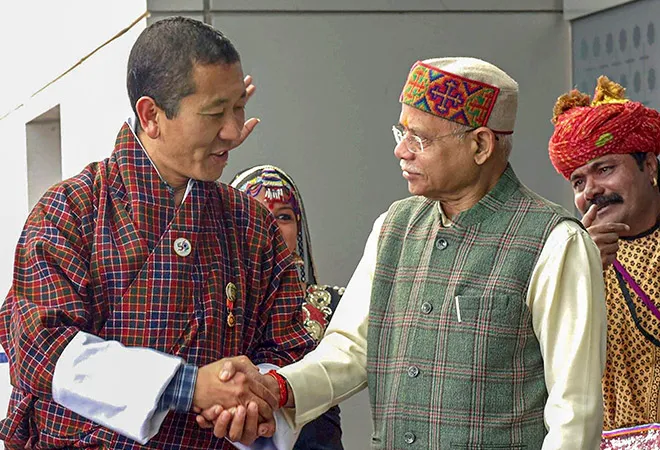
India is hosting the Bhutanese Prime Minister Dr. Lotay Tshering as he arrived in New Delhi on 27 December. This three-day visit is the PM’s first to India as well as his maiden trip abroad since assuming the important chair in November this year. Unlike, many countries in the sub-continent where relations with India, oscillate between China and India, depending on which party is in power, Bhutan stands out as the only exception.
Bhutan is of great importance to India for its location as a landlocked country squeezed between India and China. In the Doklam standoff at the tri-junction near Sikkim in 2017, Thimphu made known to Beijing about her displeasure of infringement of her border by Chinese construction activities. Bhutan had rebuffed China’s flagship infrastructure initiative, the One Belt One Road.
Following the ruling party Druk Nyamrup Tshogpa’s (DNT) surprising victory in the first round of general elections in October, many experts had signaled that bilateral relations with India were bound to hit rough weather. This fore-drawn conclusion by some people was based on the fact that the DNT, which triumphed over PDP, had not made pledges in its election manifesto on the country’s foreign policy. Also, voting out the former incumbent People’s Democratic Party that was believed to be close to India was reasoned to be a worry for India.
In the Doklam standoff at the tri-junction near Sikkim in 2017, Thimphu made known to Beijing about her displeasure of infringement of her border by Chinese construction activities.
After two weeks of DNT’s accession to the corridors of power in Bhutan, Foreign Secretary of India, Vijay Gokhale visited Bhutan. He assured India’s support for Bhutan’s development and promised to work according to Bhutan’s priorities. This gesture from India was well received by Bhutan and the visit of the Prime Minister is a testimony of friendly relations between the two.
Support for 12th Five Year Plan
India has been a development partner of Bhutan and has contributed generously towards latter’s Five Year Plans, the first was drawn in 1961 and completely funded by Bhutan. Cooperation in hydropower has over the years intensified and has evolved to become Thimphu’s major export item and a major source of its revenue.
The visiting Prime Minister of Bhutan would seek New Delhi’s support towards the 12th Five Year Plan of the Himalayan nation said to be the last mile for its UN ascribed status of a Middle Income Country. Bhutan’s total outlay for the 12th Five Year Plan is about INR 310 billion. The plan expects the government to raise INR 63 billion in grants. Bhutan is likely to ask about INR 45 billion from India.
The visiting Prime Minister of Bhutan would seek New Delhi’s support towards the 12th Five Year Plan of the Himalayan nation said to be the last mile for its UN ascribed status of a Middle Income Country. Bhutan’s total outlay for the 12th Five Year Plan is about INR 310 billion.
In the 11th Five Year Plan, India had allocated INR 45 billion along with an economic stimulus package of Rupees INR 5 billion. The total received by Bhutan in aid was INR 68 billion of the total plan outlay of INR 213 billion. However, for the 12th plan Bhutan puts thrust on diversification of sources of revenue. An expected increase in domestic revenue i.e. Nu 218 billion to 128 billion in the 11th Plan is set to reduce the country’s dependence on external partners.
During the 12th Plan, the 720 MW Mangdecchu hydropower plant would also be commissioned and tariff of this power station would have an impact on the revenue outlay of the 12th plan. Prime Minister Tshering would attempt to firm up the tariff for this hydropower plant. The country would is still be staring at a deficit of INR 27 billion after having counted the tariff of Bhutan’s rate.
Private sector participation
There is enough reason for Bhutan and India to explore cooperation beyond government initiatives. At a time when Bhutan is looking to expand and bring in a mix in its revenue basket, forging business-to-business ties between the two countries is essential. India can play an important role in helping Bhutanese private sector both manufacturing and services to build their capacities.
There is enough reason for Bhutan and India to explore cooperation beyond government initiatives.. India can play an important role in helping the Bhutanese private sector, both manufacturing and services to build their capacities.
Problems that Bhutanese traders face in bilateral trade and third country exports due to the introduction of Goods and Services Tax and demonetisation of currency notes by India, needs to be addressed by New Delhi. Particularly, in case of GST, Bhutan has requested India to exempt agricultural goods from the tax.
Dr. Tshering’s three-day visit to New Delhi follows the visit of Maldives President, Ibrahim Mohamed Solih who also chose New Delhi for his maiden state visit. Solih during his visit, called India, her ‘closest friend,’ instill more hope from small countries in her neighbourhood who have not deterred to use the China card. In case of India-Bhutan relations, it has always remained an exception and going by the trend is likely to remain so in the near future.
The views expressed above belong to the author(s). ORF research and analyses now available on Telegram! Click here to access our curated content — blogs, longforms and interviews.




 PREV
PREV


